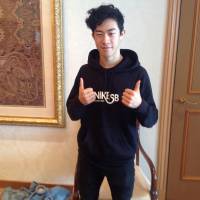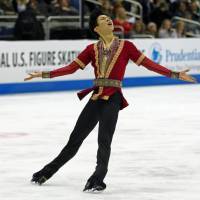With less than two months to go until the Pyeongchang Olympics, American Nathan Chen is finding himself the focus of a lot of attention. And with good reason.
Chen, an 18-year-old from Salt Lake City, is the defending U.S. champion and has won every competition he has entered this season (U.S. International Classic, Cup of Russia, Skate America, Grand Prix Final).
His athleticism and powerful quadruple jumps have made Chen one of the top three contenders for the gold medal in South Korea, along with defending Olympic champion Yuzuru Hanyu and world silver medalist Shoma Uno.
During his recent trip to Nagoya for the GP Final, Chen sat down with Ice Time for an interview and discussed a wide range of topics. I found him to be confident, intelligent and well spoken.
With Hanyu missing the GP Final due to injury after having won it four years in a row, I asked Chen about the world champion.
"Yuzuru has definitely brought a lot to the sport. I would say I would not be the skater I am today if not for him and the other top skaters," Chen stated. "We are all pushing each other to do more. We are all pushing each other to be better. That's helped all of us."
Chen admitted that Hanyu's absence was significant in the big picture.
"He is not in this competition, and got injured. So you feel the lack of his presence," Chen commented. "It always brings a lot to the Japanese fans. They get a lot more excited when he is here. Without him it feels different."
Chen, who trains in Lakewood, California, acknowledged that he has been inspired by Hanyu's achievements in the sport.
"He has motivated me as a kid growing up. He has done a lot of crazy things," Chen said. "I think that has pushed me to be a better skater."
The young star gave Ice Time the back story about how he began skating.
"I began skating when I was 3. It was during 2002, the year the Olympics were held in Salt Lake City," Chen recalled. "Largely I began skating because I wanted stuff to do outside of school. My mom decided to put me into figure skating."
Fate put Chen in a prime place to become a skater.
"I began skating in the official practice venue of the 2002 Games," he reflected. "It was a huge Olympic atmosphere with Apollo Ohno sitting on the wall every day when I walked into the rink. That was really cool and very inspiring to see."
Chen made it clear that the challenge of skating is what attracted him to it.
"Skating is a sport that I found a lot of interest in from a very, very young age," he remembered. "Ultimately I think that being on the ice, being in the cold, and trying things and challenging myself in different ways is something that made me really interested in skating."
Chen, who was the youngest U.S. novice champion ever at age 10, claims that challenge continues to this day.
"Every time I learn something new on the ice, it definitely makes me want to keep on doing more and keep on learning new things," he stated. "It's always a feeling that I can't find anywhere else. It's really something that keeps me motivated to this day."
Chen, who is 168 cm, had various interests and played several sports as a youngster in Utah.
"I did gymnastics, played hockey, obviously skated, did ballet and played piano," he said.
Ice Time inquired about which skater was Chen's favorite growing up.
"Evgeni Plushenko. He's the first one that really inspired me," Chen said firmly. "He's the first one that I really watched, honestly, in skating. He's the first one I felt motivated by. I was also very interested in watching his quads. Watching his programs.
"I really liked his character on the ice. Really my first skating idol."
Chen, who is most known for his record-setting number of quads, talked about the difficult jumps. He can do five different quads (lutz, flip, salchow, toe loop, loop).
"Quads in skating are very definitely difficult technical elements," Chen commented. "In terms of the number of quads we are doing, it is relatively new to the sport.
"Adding a lot of quads to the program is very new, but also very risky. It's definitely very challenging. Quads, I think, make the sport really interesting. It makes me very interested in doing them. I really enjoying doing quads."
Chen, who was a two-time U.S. junior champion, claims that landing a quad gives him a special feeling.
"I always enjoy that challenge of doing the quads," he said. "Every time that I land it, it is always a feeling I want to recreate. It makes me very passionate about figure skating."
Ice Time mentioned that some people — including Olympic legend Dick Button — have become disenchanted with skating because of the recent focus on technical elements over artistry.
"Really our goal right now is to try and balance the two," Chen stated. "With added jumps definitely adds a lot of risks. Takes the energy of out us. But it has been playing off in terms of the score.
"I think that my goal is to continue working on both aspects and trying to bind the two. I'm hoping I will be able to do that at both nationals and the games."
Chen, who is Chinese-American, made no secret of how much he is looking forward to his first Olympics.
"I'm very excited for the Olympics. This whole season everyone has been talking about the Olympics," he told Ice Time. "I grew up in Salt Lake City. The 2002 Olympics were held there. I really grew up in an Olympic town."
Chen said the location of the 2002 Games was a catalyst for his taking up skating.
"I largely started figure skating because of the Olympics," he stated. "It's sort of gone full circle and I'm on my way to my first Olympics, which is something that has motivated me, inspired me, my entire time as a figure skater.
"Olympics has definitely been a huge dream of mine for a long, long time. To finally have the opportunity to potentially make that Olympic team is so huge."
Chen will go into the U.S. nationals in San Jose, California, next month as the prohibitive favorite to win his second straight title. The teenager will then carry the hopes of a nation that was once a powerhouse in singles to South Korea.
With the popularity of skating in the U.S. on the wane for a long time now, fans and organizers alike are hoping that Chen bringing home the gold could revitalize interest.
Ice Time questioned Chen about this issue.
"Largely winning a gold medal will help. I think that it (interest in skating) already has risen a lot, especially from an advertising standpoint. I see a lot more figure skating around," he said.
Chen believes incremental progress is being made in returning skating to the heights it once knew in the U.S.
"I feel the general consensus around figure skating is a lot more welcoming than before," he offered. "I'm hoping that it will continue to do that. I'm hoping with the successes that I've had and the next generation of men's skating and skating in general within ladies, pairs, dance it will start to increase in the U.S."
With almost all of his time and energy focused on skating, Ice Time wondered if Chen was into other sports.
"Currently I follow NBA. That's mostly the sport I follow outside of skating," he stated. "Jazz, Celtics, Cavs. Mostly NBA. A tiny bit of NHL, but not so much over the past couple of years."
Despite his rivalry with Hanyu and Uno, Chen actually has many Japanese fans. Ice Time met several of them at the GP Final and was even informed about a Nathan Chen Fan Club party in Nagoya.
I queried Chen about whether it was somewhat unusual to have fans in a country that his chief rivals come from.
"It's cool to have the support of all the Japanese fans, specifically since they have great, very good skaters in their country," he commented. "It's always great to have support regardless of where I am, and the Japanese fans are very supportive and very welcoming to me. It's always a great feeling."
Chen told Ice Time he has always enjoyed his trips to Japan.
"This probably my fifth or sixth time in Japan. I have been fortunate to go to different cities every time I've come here," he noted. "I have been able to see some of the sights all around Japan. It's been great every time I've been here."
I couldn't let Chen go without asking him about one of Japan's most legendary skaters ever — three-time world champion Mao Asada — and her impact on the sport.
"She meant a lot to skating. I shared a coach with her," Chen said. "Rafael (Arutunian) coached her for a while. Any time that he talks about skating, he somehow ties her into the conversation.
"Definitely a big idol to me. Her skating was incredible. I was honored to be able to watch her a couple of times in competition at her best. She had a triple axel, which was really cool to female skating at that time.
"She brought a lot to Japanese figure skating and figure skating in general."
High drama at Japan nationals
The Japan nationals will begin on Thursday at Musashino Forest Sports Plaza in Tokyo and culminate late Sunday evening with the announcement of the Japan team for the Pyeongchang Games.
The only question on the men's side is who will be the third skater selected after Hanyu and Uno.
The real drama is on the women's ledger, where seven skaters (Satoko Miyahara, Wakaba Higuchi, Kaori Sakamoto, Mai Mihara, Marin Honda, Rika Hongo, Yuna Shiraiwa) are vying for just two spots.
Three-time national champion Miyahara and Higuchi took momentum into the GP Final, but after finishing fifth and sixth, respectively, can't be considered locks to make the team.
It would be much easier for the JSF if Miyahara won the title outright, because if she does not it will have to consider her along with the other skaters for the second spot, which could be very dicey.
What has been achieved in the past is past. That goes for Miyahara and everybody else. Japan must send two healthy skaters to South Korea who have the chance to achieve good results. There is no room for sympathy.
The unfortunate reality is there are going to be some broken hearts come Sunday night.
Ice Time's predictions for the 2018 Japan Olympic team:
Men
✺ Yuzuru Hanyu
✺ Shoma Uno
✺ Keiji Tanaka
Women
✺ Kaori Sakamoto
✺ Wakaba Higuchi


















With your current subscription plan you can comment on stories. However, before writing your first comment, please create a display name in the Profile section of your subscriber account page.